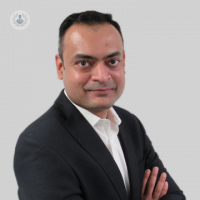Suffering from shoulder pain? Expert advice on the most effective non-surgical forms of treatment
Escrito por:For those wishing to avoid surgery, there are a number of effective conservative methods of treatment for chronic shoulder pain which help to relieve discomfort, increase range of movement and improve quality of life. In this detailed guide, Dr Roshan Thawale, a highly esteemed consultant in anaesthetics and pain medicine, shares his expert insight on non-surgical treatment options for shoulder pain, how they are administered and evaluates how suitable and effective they can be for different patient profiles.

Can shoulder pain be treated non-surgically?
Yes, the first option is medication. Over the counter pain killer medication is the first step in the right direction. Always consult with your doctor (GP) or pharmacist to make sure you these medications are not contraindicated in your case.
Another conservative (non-surgical) option is targeted nerve blocks followed by nerve ablation. You will need to consult a pain management specialist consultant to make sure this is the correct treatment for you. In other cases, pain relief injections can be beneficial such as steroids (cortisol) injected into joints, bursae or ligaments but targeted nerve blocks can provide specific and worthwhile pain relief which may be long lasting for some patients.
In resistant cases, novel techniques like stem cell injection therapy and PRP (Platelet Rich Plasma) injection have been increasingly reported with good results. Other therapies like rehabilitative physiotherapy remain the mainstay of treatment as it not only lessens pain and improves range of motion but also reduces risk of re-injury and developing frozen shoulder.
I also advocate that acupuncture, hot and cold compresses along with anti-inflammatory local skin rubs are also effective as conservative way of managing shoulder pain.
What are the most effective non-surgical pain interventions for shoulder pain?
Most non-surgical shoulder pain management treatments are bespoke to the patient depending upon their individual pathology and diagnosis. One size doesn't fit all.
As I mentioned before, the nerves supplying shoulder joints are good targets for diagnostic blocks. When a patient reports worthwhile but temporary pain relief with some improvement in range of motion and overall satisfaction, the pain management specialist proceeds with pulsed radiofrequency ablation of these nerves for fairly long lasting pain relief. Nerves do eventually start to transmit pain signals but they may not feel as painful as they did before the procedure.
In our consensus based experience, suprascapular nerve block followed by pulsed radiofrequency ablation may reduce shoulder pain scores by more than fifty per cent for more than nine to twelve months.
Other treatments, such as SHAC (shoulder anterior capsular nerve group) block, are also being increasingly combined with suprascapular nerve block to achieve over a sixty to seventy-five per cent reduction in pain scores with significant improvement in pain restricted range of motion and quality of life in general.
Increasing evidence base for PRP (Platelet Rich Plasma) and stem cell injection therapy as part of regenerative medicine is being applied in chronic surgical pain patients with excellent outcomes.
When is surgery considered to treat shoulder pain?
Surgery can be considered with its factoring merits and possible adverse events after discussion with your orthopaedic shoulder consultant surgeon. Your orthopaedic surgeon may be able to give you the ballpark chances of success and will inform you of what to expect during the post-surgical rehabilitation period.
Many patients who are deemed too young to consider shoulder replacement surgery are encouraged by the surgeon, or decide purely by personal preference, to undergo non-surgical pain management treatment. This is also often the case in elderly or frail patients, or those who are considered too high risk to undergo major joint replacement. For these patients, nerve blocks and nerve ablation may become the definitive, or destination treatment.
In your opinion, what is the most effective non-surgical intervention for shoulder pain?
Our experience in the UK, along with NICE clinical evidence, suggest that suprascapular nerve block followed by pulsed radiofrequency ablation is the most effective non-surgical pain intervention.
You may want to avoid surgery or you may have been told that you are at high risk for having surgery so this modality may work as bridging treatment or destination treatment. If you are on the waiting list to have shoulder surgery and would like to alleviate extremes of shoulder pain until you get scheduled in, you may choose to have this treatment as a time-buying measure in the interim. For some, it may be the ultimate destination treatment as they may not choose to have surgery in future.
I would be very cautious to select a single treatment modality as most effective as in the medical world, nothing is one hundred per cent guaranteed so it's best that you consult with your pain management specialist and orthopaedic shoulder surgeon with an open mind.
Dr Roshan Thawale is one of the UK’s leading specialists in anaesthetics and pain medicine. To schedule a consultation with Dr Thawale, simply visit his Top Doctors profile.



